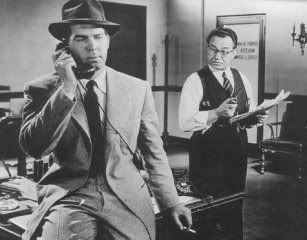Start at the end. You can't tell a story if you don't know where it's going.

I've long wanted to take advantage of the Ryder Film Series in town, so tonight I made an evening of it with two crime films made six decades apart. Representing the full flowering of Billy Wilder's talent, 1944's Double Indemnity, based on the novel by James M. Cain and written for the screen by Wilder and Raymond Chandler, is the quintessential film noir. From the fatalistic voice-over narration (delivered by Fred MacMurray, perfectly cast against type) to the manipulative femme fatale (effortlessly embodied by Barbara Stanwyck) to the meticulously planned murder that unravels before their eyes (thanks to the doggedly determined insurance investigator Edward G. Robinson), this is a dark vision of American society that doesn't put a foot wrong. There's a reason why this film is always on the syllabus when classes about film noir are taught.

One of the latest in a long line of neo-noirs is The Lookout, the directorial debut of Scott Frank, heretofore best known as the screenwriter of such superior crime films as Dead Again, Get Shorty and Out of Sight. The film stars Joseph Gordon-Levitt as a hot-shot hockey player from a rich family who is in a tragic (and entirely preventable) car accident that leaves him brain damaged. As a result, he needs to keep a notebook full of reminders about where things are and when he's supposed to do things, like meet his case worker for lunch or go to his job as the night janitor at the local bank. On the surface, the film may sound like Memento redux, but Frank has different aims in mind and Gordon-Levitt gives a thoroughly compelling performance as a young man haunted by a past he is unable to return to.
The film also features Jeff Daniels as Gordon-Levitt's blind roommate Lewis, who wants to open a restaurant with him, Matthew Goode as the shady character who befriends him out of nowhere, and Isla Fisher as the former exotic dancer Goode uses to hook him. Hook him for what purpose? Well, he does work at a bank. How the plot plays out may be somewhat predictable, but Frank's dialogue is as sharp as ever and his direction is quite accomplished for a neophyte. Then again, considering some of the directors who have interpreted his work (Branagh, Soderbergh, Spielberg), it's clear he was keeping a notebook of his own.